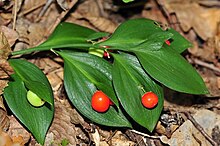Ruscus hypoglossum
| Mouse Thorn | |
|---|---|

| |
| Scientific classification | |
| Kingdom: | Plantae |
| Clade: | Tracheophytes |
| Clade: | Angiosperms |
| Clade: | Monocots |
| Order: | Asparagales |
| Family: | Asparagaceae |
| Subfamily: | Nolinoideae |
| Genus: | Ruscus |
| Species: | R. hypoglossum
|
| Binomial name | |
| Ruscus hypoglossum | |
Ruscus hypoglossum is a small evergreen shrub with a native range from Italy north to Austria and Slovakia and east to Turkey and Crimea.[1] Common names include spineless butcher's-broom,[2] mouse thorn and horse tongue lily. The species name comes from two Greek words ὑπό (hypo) and γλῶσσα (glōssa) meaning under and tongue.
Description
The mature plant shrub will eventually reach about 46 cm (18 in) in height. It has a creeping rootstock and leaf-like phylloclades or flattened stems that are about 8 cm (3 in) long to 4 cm (1+1⁄2 in) wide tapering at both ends. True leaves are smaller green appendages around the flowers. Small yellow flowers bloom in the axil of a leaf-like bract 2.5–3.8 cm (1–1.5 in) long on upper side of phylloclade. Fruit is a rarely produced red globose berry 0.6 to 1.3 cm (0.25 to 0.5 in) wide.[3]
Gallery
-
True leaf and flower on the phylloclade.
-
Flower.
-
Shrubs.
-
Fruits and seeds.
References
- ^ Halada, Ľ. "Ruscus hypoglossum L. in Slovakia" (PDF). Thaiszia. 4: 183–195. ISSN 1210-0420.
- ^ "BSBI List 2007". Botanical Society of Britain and Ireland. Archived from the original (xls) on 2015-01-25. Retrieved 2014-10-17.
- ^ "Ruscus hypoglossum". University of Connecticut - Ecology and Evolutionary Biology Plant Growth Facilities. Retrieved 19 March 2012.




